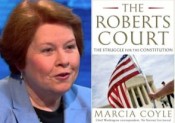Free Forum Q&A – MARCIA COYLE, Author of THE ROBERTS COURT: Struggle for the Constitution
Written on July 9th, 2013 |
Aired: 07/07/13
A friend tells the story of striking up a conversation with a hip looking man in his late 20s-early 30s in a movie line on the west side of LA shortly before the 2004 election between George Bush and John Kerry. He asked the young man who he planned to vote for, he answered that he hadn’t made up his mind. My friend said to him, “Two words. Supreme Court.” To which the young man replied, “Oh, are we voting for them too?”
While we may be disappointed in his apparent lack of civics knowledge, in his own way, he spoke the truth. The most lasting actions a president takes may be his appointments to the Supreme Court. Supreme Court justices serve for as long as they wish or as long as they are able. Their decisions very often set precedents that can live forever. Bush had appointed John Roberts Chief Justice in his first term, but according to today’s guest, it was his second term appointment of Samuel Alito to replace Sandra Day O’Connor that really solidified the Roberts Court.
O’Connor had been a much more moderate conservative than Alito has proven to be. The center of the court shifted to the right, which may matter little in decisions with large majorities – more than 50% of cases each term are decided unanimously or by 8-1 or 7-2 votes — but can be crucial in decisions decide 5-4.
MARCIA COYLE has chosen to focus her book THE ROBERTS COURT: The Struggle for the Constitution on four such 5-4 decisions – Citizens United on campaign finance; District of Columbia v Heller on gun control; on race in school choice; and on the constitutionality of the Affordable Care Act.
SPECIAL: Terrence fill in hosts on KCRW
Written on August 8th, 2011 |
Aired 08/05/11
Left, Right & Center
The global markets have been heading steadily south for the last two weeks, but on Thursday, they took a sharp dive. The Dow lost more than four percent of its value, its worst day in three years. As our program went to air on Friday afternoon, the markets continued to sputter downward. There was a bit of good news: unemployment went down and jobs went up in July, but only slightly. The jobs report appears to have prevented another day like Thursday on Wall Street, but is it enough to calm investor fears that we're entering into a double-dip recession? And with the grim economic forecast and a bruising fight over the budget, what are the political implications of all this for President Obama and lawmakers on Capitol Hill? What are their prospects for re-election? (Terrence McNally sits in for Matt Miller. Chrystia Freeland joins us as our special guest panelist.)
